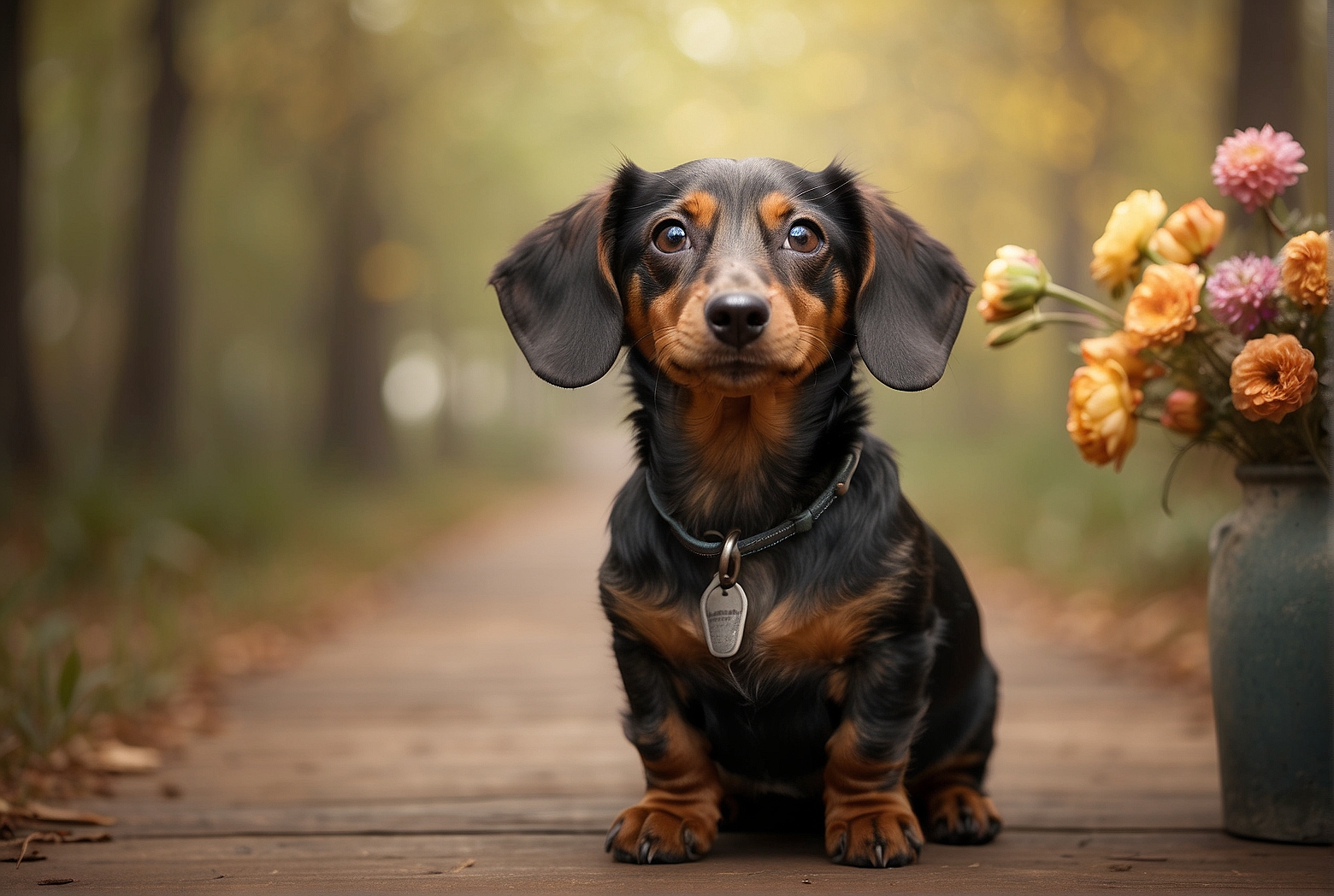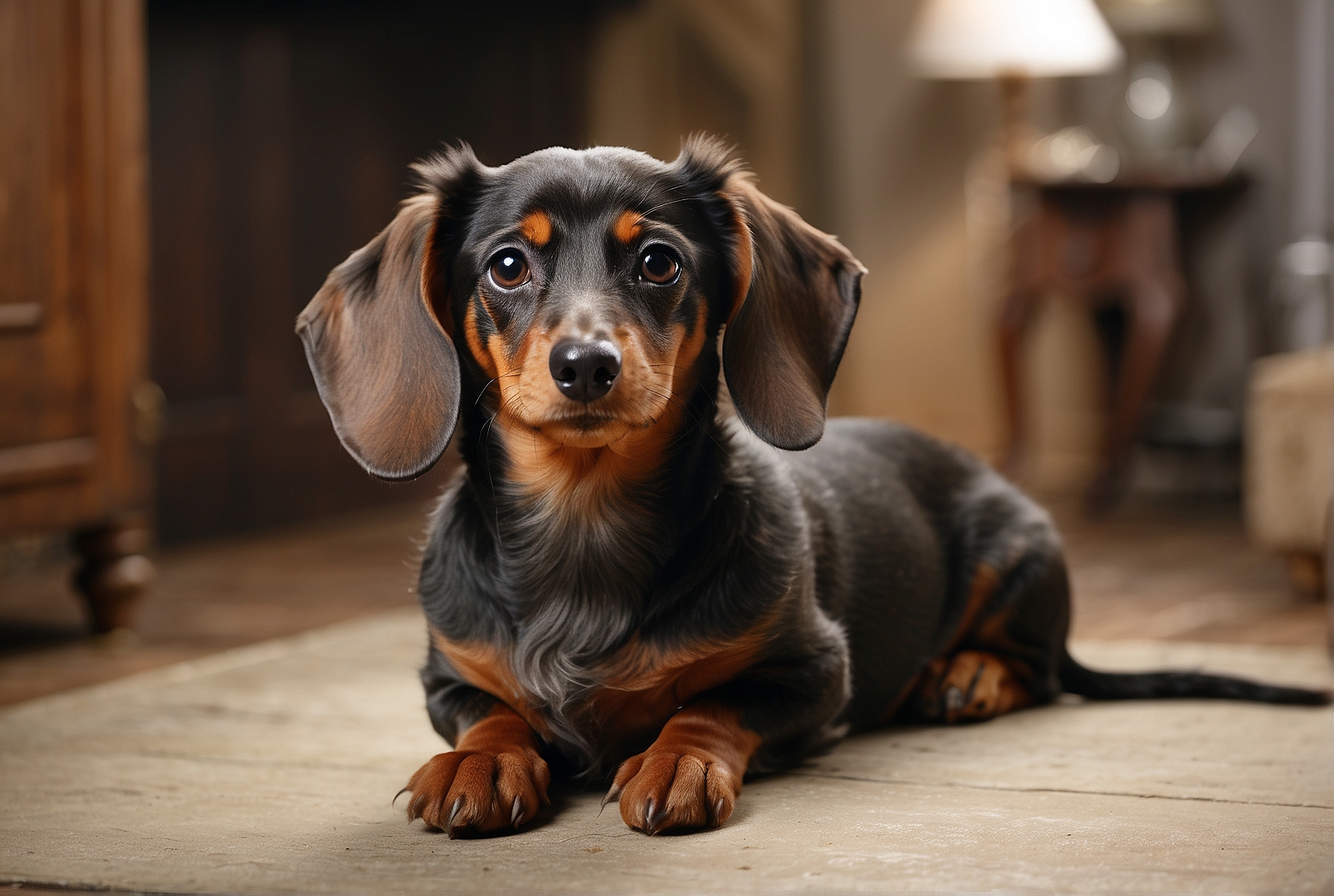Last Updated on April 24, 2024 by admin
If you’re a proud owner of a dachshund or considering welcoming one into your home, you may have wondered: do dachshunds smell? Well, in this article, we’ll explore the various factors that can contribute to the unique aroma of our beloved four-legged friends, and provide you with some practical tips on how to manage and minimize any potential odors. So, let’s address the scent of dachshunds and ensure that your home remains fresh and pleasant for both you and your furry companion.
How to Manage the Smell of Dachshunds
Regular grooming
Brushing
Regular brushing is an essential part of maintaining your dachshund’s hygiene and managing any potential odor issues. Brushing helps remove loose fur, dirt, and debris, preventing them from accumulating and causing unpleasant odors. It also stimulates the skin and distributes natural oils, keeping your dachshund’s coat healthy and odor-free. Aim to brush your dachshund at least once a week, or more frequently if they have a longer or thicker coat.
Bathing
While dachshunds don’t require frequent baths like some other breeds, regular bathing is still important to keep them clean and smelling fresh. Bathing your dachshund every two to three months should be sufficient, unless they have gotten particularly dirty or have a unique odor issue. Use a gentle, dog-specific shampoo and rinse thoroughly to ensure all soap residue is removed. Remember to dry your dachshund thoroughly after the bath to prevent any lingering odors from wet fur.
Ear cleaning
Dachshunds are prone to ear infections, and these can contribute to unpleasant smells. To prevent this, it is crucial to clean your dachshund’s ears regularly. Gently wipe the outer part of the ear with a dog-specific ear cleaning solution and a cotton ball or a soft cloth. Avoid inserting anything into the ear canal, as it can cause injury. If you notice any redness, discharge, or a foul smell, consult your veterinarian for further evaluation and treatment.

Dental care
Dental hygiene is often overlooked but plays a significant role in managing odor in dachshunds. Regularly brushing your dachshund’s teeth with a dog-specific toothbrush and toothpaste can help remove plaque and tartar buildup, which can contribute to bad breath. Additionally, providing chew toys or dental treats can help promote good dental health. If you notice any signs of dental issues, such as swollen gums or difficulty eating, consult your veterinarian for a dental examination.
Maintaining a clean environment
Regularly clean their bedding
Your dachshund’s bedding can accumulate odors over time, so it’s important to clean it regularly. Wash their bedding, including blankets, bed covers, and pillows, using a mild detergent. Check the care labels for washing instructions and use hot water, if possible, to ensure thorough cleaning. Avoid using strong-smelling fabric softeners or detergents, as they can irritate your dachshund’s skin and potentially contribute to odors.
Vacuum and mop regularly
Dachshunds can shed quite a bit, especially during certain seasons, so it’s important to vacuum your home regularly to remove hair and dander. Pay close attention to areas where your dachshund spends the most time, such as their favorite lounging spots. Mopping hard floors with a pet-friendly floor cleaner can also help remove any lingering odors and keep your home smelling fresh.
Use odor-neutralizing products
In addition to regular cleaning, using odor-neutralizing products can help combat any lingering smells. Look for pet-specific odor-neutralizing sprays or powders that are safe for use around dogs. These products work by neutralizing and eliminating odors rather than masking them. Be sure to follow the instructions on the product labels for proper use and avoid using any products that may be toxic to dogs.

Keep the house well-ventilated
Proper ventilation is important for maintaining a fresh-smelling home. Open windows or use exhaust fans to allow fresh air to circulate throughout your house. Good airflow helps prevent odors from becoming trapped and lingering in confined spaces. If you live in a climate where opening windows is not practical, consider using a fan or an air purifier to assist with air circulation and odor control.
Proper diet and nutrition
Feed high-quality dog food
The quality of your dachshund’s diet plays a significant role in their overall health and can affect body odor. Opt for high-quality dog food that is free from artificial additives and fillers. Look for options that contain real meat as the primary ingredient, as this provides essential nutrients and can help minimize body odor. Consulting with your veterinarian can help you choose the best diet for your dachshund’s specific needs.
Avoid excessive treats and table scraps
While it’s tempting to give your dachshund treats and table scraps, these can contribute to odor issues. Some human food, spices, and seasonings can cause gastrointestinal upset and result in odor-producing gas. Additionally, excessive treats and fatty foods can lead to weight gain, which can cause additional hygiene issues. Stick to a balanced diet and limit treats to those specifically made for dogs.
Consider digestive supplements
If your dachshund frequently experiences digestive issues or has a sensitive stomach, adding digestive supplements to their diet may help improve digestion and reduce odor. Probiotics and digestive enzymes can promote a healthy gut and aid in better nutrient absorption, which can contribute to fewer digestive disturbances. Consult with your veterinarian to determine if these supplements are suitable for your dachshund and to find the right ones for their needs.
Monitor water intake
Water intake can also impact your dachshund’s odor. Make sure your dachshund has access to clean, fresh water at all times. Regularly check their water bowl and refill it as needed. Keep in mind that excessive drinking or changes in water consumption patterns can be a sign of an underlying health issue, so it’s essential to monitor this aspect of their daily routine.
Addressing potential health issues
Consult a veterinarian
If you notice persistent odor issues despite following proper hygiene practices, it’s important to consult with your veterinarian. They can evaluate your dachshund’s overall health and determine if there are any underlying medical conditions contributing to the smell. Your veterinarian may perform tests or recommend specific treatments to address the issue effectively.
Check for skin infections
Dachshunds are prone to skin infections, especially in areas with folds or where their skin comes into contact with the ground. These infections can cause odor and discomfort for your dachshund. Regularly check their skin for any signs of redness, irritation, or unusual odor. If you notice anything concerning, consult your veterinarian as soon as possible for appropriate diagnosis and treatment.
Treat dental problems
Dental issues, such as gum disease or tooth decay, can contribute to bad breath and overall odor. Your veterinarian can perform a dental examination and recommend any necessary treatments, such as professional dental cleaning or extractions. In addition to regular brushing, incorporating dental chews or treats into your dachshund’s routine can also help promote good dental hygiene.
Manage allergies
Dachshunds can be prone to allergies, which may manifest as skin issues, excessive scratching, or unpleasant odors. If you suspect your dachshund has allergies, it’s crucial to identify and address the underlying triggers. These may include environmental allergens, certain foods, or sensitivities to grooming products. Consult your veterinarian for guidance on proper allergy management and treatment options.
Regular exercise
Take your dachshund for walks
Regular exercise is beneficial for both physical and mental health and can help reduce unwanted odors. Dachshunds are active dogs that require daily exercise to burn off energy and stay healthy. Take your dachshund for walks or provide opportunities for them to run and play in a secure, enclosed area. Exercise helps improve blood circulation, which can contribute to healthier skin and coat.
Provide mental stimulation
In addition to physical exercise, mental stimulation is essential for your dachshund’s well-being. Boredom can lead to undesirable behaviors and potential stress, which may contribute to odors. Engage your dachshund in activities such as puzzle toys, obedience training, or interactive playtime to keep their mind active and stimulated.
Engage in active playtime
Active playtime not only provides exercise but also strengthens the bond between you and your dachshund. Engage in activities that encourage movement, such as fetch or tug-of-war. These types of games help keep your dachshund physically active, burn excess energy, and promote a happier and healthier lifestyle.
Consider professional dog training
If your dachshund exhibits behavioral issues that contribute to hygiene problems, professional dog training may be beneficial. Trainers can help address specific behaviors, such as rolling in strong-smelling substances, or work on overall obedience and good hygiene habits. Enrolling your dachshund in a training program can provide valuable guidance and support for maintaining cleanliness.
Teaching good behavior and habits
Ensure proper potty training
Effective potty training is crucial for maintaining a clean and odor-free environment. Take the time to properly train your dachshund to eliminate in designated areas, such as outdoors or on a puppy pad. Consistency, positive reinforcement, and patience are key when it comes to successful potty training. Accidents may happen, especially during the initial stages, but with proper training, your dachshund will learn to associate specific locations with bathroom breaks.
Establish a routine
Establishing a consistent daily routine for your dachshund can help promote good behavior and habits. Dogs thrive on routine and predictability, so setting regular feeding, exercise, and potty times can help maintain cleanliness and minimize potential odor issues. Stick to your established routine as much as possible to create a stable and well-regulated environment for your dachshund.
Discourage rolling in strong-smelling substances
Dachshunds have a curious nature and may be tempted to roll in strong-smelling substances, such as feces or decaying matter. This behavior can lead to unpleasant odors on their coat. It’s important to discourage this behavior through training and redirection. If you catch your dachshund displaying interest in such substances, distract them with a toy or offer an alternative activity to divert their attention.
Train them to stay clean
Teaching your dachshund good hygiene habits is an ongoing process. Encourage behaviors such as self-grooming and discourage habits like excessive scratching or licking. If your dachshund gets dirty or muddy during outdoor adventures, gently clean them up with a damp cloth or consider a quick rinse if necessary. Through consistent training and positive reinforcement, you can help your dachshund develop and maintain cleanliness.
Use of deodorizing products
Dog-specific deodorizing sprays
Dog-specific deodorizing sprays can be a useful tool to freshen up your dachshund’s coat between baths. These sprays are formulated to neutralize unpleasant odors and leave behind a pleasant scent. However, it’s important to choose products that are safe for dogs, as some human deodorizing sprays can contain ingredients that may be harmful to pets. Follow the instructions on the product label and be mindful not to use excessive amounts.
Dry shampoos
Dry shampoos are another option for keeping your dachshund smelling fresh without the need for frequent baths. These products typically come in powder or foam form and can be applied directly to your dachshund’s coat. Massage the dry shampoo into their fur, focusing on areas prone to odors, then brush it out. Dry shampoos absorb excess oil and dirt, leaving your dachshund’s coat clean and refreshed.
Odor-neutralizing candles
Odor-neutralizing candles can help improve the scent of your home while also eliminating pet odors. Look for candles specifically designed to neutralize pet odors or choose natural options such as soy or beeswax candles. Place the candles in well-ventilated areas, away from any potential hazards, and never leave them unattended. Remember, candles should be used as a supplementary method alongside regular cleaning and proper pet hygiene practices.
Air purifiers
Air purifiers can effectively remove airborne particles and odors, contributing to a fresher and cleaner indoor environment. Look for air purifiers equipped with HEPA filters that effectively capture pet dander, dust, and other allergens. Place the air purifier in a central location for maximum coverage, and make sure to follow the manufacturer’s instructions regarding filter changes and maintenance.
Regular veterinary check-ups
Schedule routine visits
Regular veterinary check-ups are crucial for your dachshund’s overall health and can help identify and address any potential odor-related issues. It is recommended to schedule routine visits with your veterinarian at least once a year. During these visits, your veterinarian will perform a physical examination, discuss any concerns, and may recommend additional tests or treatments if necessary.
Discuss any concerns about smell
If you have noticed persistent or unusual odor issues with your dachshund, be sure to discuss your concerns with your veterinarian. They can evaluate your dachshund’s health, assess any potential underlying causes of the smell, and provide appropriate guidance and treatment options. Open communication with your veterinarian is key to maintaining your dachshund’s well-being and managing any odor-related concerns effectively.
Address any underlying health issues
Regular veterinary check-ups are also an opportunity to address any underlying health issues that may contribute to unpleasant odors. Conditions such as skin infections, dental problems, or allergies can cause odors in dogs. Your veterinarian will be able to diagnose these issues and recommend appropriate treatments to alleviate the odor and improve your dachshund’s overall health.
Follow vaccination and medication schedules
Ensuring your dachshund is up-to-date on vaccinations and preventive medications is essential for their overall health and well-being. Vaccinations protect against infectious diseases that can potentially cause odors or other health issues. Regularly administer flea and tick preventives as recommended by your veterinarian to prevent parasites that can contribute to odor and discomfort.
Frequent waste removal
Clean up after your dachshund immediately
Promptly cleaning up after your dachshund is crucial in maintaining cleanliness and preventing unwanted odors. Whenever your dachshund eliminates, whether it’s during walks or in designated areas indoors, make sure to clean up the waste as soon as possible. Use plastic bags or pooper scoopers to dispose of the waste properly and prevent lingering odors.
Dispose of waste properly
When disposing of your dachshund’s waste, follow your local guidelines and regulations. Bag the waste securely and dispose of it in designated waste bins or containers. Avoid discarding waste in public spaces, gardens, or water sources, as it can pose health and environmental risks. Proper waste disposal not only helps manage odors but also contributes to maintaining a clean and hygienic environment for everyone.
Regularly clean litter boxes or designated areas
If your dachshund uses a litter box or designated indoor elimination area, it’s important to clean and maintain it regularly. Scoop litter boxes daily to remove waste and replace the litter as needed. For designated areas, clean them with pet-friendly disinfectants or soapy water to minimize odors and ensure optimal hygiene. Regular cleaning helps prevent the buildup of bacteria and odors, keeping your home fresh and clean.
Consider using odor-absorbing products
To further manage odors associated with waste, consider using odor-absorbing products designed specifically for pet waste areas. These products help neutralize and minimize unpleasant smells, making them ideal for litter boxes or designated spots in your yard. Follow the instructions provided with the products to ensure safe and effective usage.
Train your dachshund good hygiene habits
Introduce grooming routine early
Starting a grooming routine early in your dachshund’s life helps establish good hygiene habits. Begin by introducing them to grooming tools such as brushes and combs, gradually teaching them to associate grooming with positive experiences. Make grooming sessions enjoyable and rewarding, using praise and treats to reinforce good behavior. By instilling good hygiene habits from an early age, you can set the foundation for a well-groomed and pleasant-smelling dachshund.
Reward and reinforce positive hygiene behavior
Positive reinforcement is a powerful tool in training good hygiene habits. Whenever your dachshund displays positive hygiene behavior, such as staying clean or allowing you to groom them, reward them with treats, praise, or playtime. This positive association reinforces the desired behavior and encourages them to continue practicing good hygiene habits.
Be consistent with training
Consistency is key when training your dachshund good hygiene habits. Establish a regular grooming schedule and stick to it, ensuring baths, brushing, and ear cleaning are done consistently. Reinforce the behaviors you want to encourage and discourage any unwanted habits promptly and consistently. By being consistent, you can help your dachshund develop and maintain good hygiene habits in the long term.
Consider professional grooming services
If you find grooming your dachshund at home challenging or if you prefer professional assistance, consider utilizing professional grooming services. Professional groomers are experienced in handling dachshunds and can provide comprehensive grooming services that include bathing, hair trimming, nail trimming, and ear cleaning. Professional groomers can also offer valuable advice on maintaining your dachshund’s hygiene between grooming sessions.
Managing the smell of your dachshund is a combination of proper hygiene practices, regular veterinary care, and maintaining a clean environment. Through regular grooming, proper diet and nutrition, exercise, and consistent training, you can ensure that your dachshund remains fresh-smelling and healthy. Remember, if you have any concerns about odor or your dachshund’s overall well-being, it’s important to consult with your veterinarian for personalized guidance and advice.




